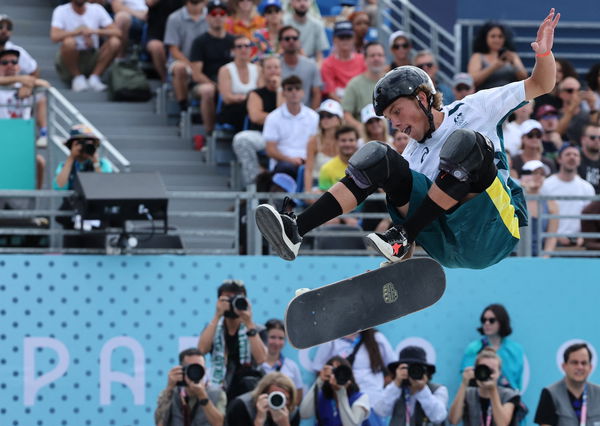
via Reuters
Paris 2024 Olympics – Skateboarding – Men’s Park Final – La Concorde 4, Paris, France – August 07, 2024. Keegan Palmer of Australia in action. REUTERS/Mike Blake

via Reuters
Paris 2024 Olympics – Skateboarding – Men’s Park Final – La Concorde 4, Paris, France – August 07, 2024. Keegan Palmer of Australia in action. REUTERS/Mike Blake
From pole jams to high-flying tricks, skateboarding has become synonymous with American culture. Something that brought a drastic change in the entire fashion scene as well, skateboarding has evolved from just a hobby to a mighty Olympic event. Every kid out there has dabbled with a skateboard here and there. Sometimes trying out new tricks or just following in the footsteps of “Holmes”. Christian Rosha Hosoi, also known as “Holmes” or “Christ” is a legend in the skateboarding scene. Starting as young as 8, Hosoi managed to become a pro at the age of just 14. From there on out, he was unstoppable. However, for all the skateboarding fans, Hosoi ain’t the only one joining us today for our EssentiallySports Think Tank interview.
Alongside him, we are being joined by Billy Tuchscher. Being appointed as the CEO of the Skateboarding Hall Of Fame back on May 10th, Tuchscher will surely expand the reach and impact of the global skateboarding community. And who could be the best person to interview both Hosoi and Tuchscher? Well, our Think Tank host and president of Brand Innovators Sports, Trey Holder. So join us, as Hosoi and Tuchscher talk about how skateboarding went from 80s subculture to Olympic phenom.
ADVERTISEMENT
Article continues below this ad
Christian Rosha Hosoi talks about old-school skating
Skateboarding became the middle ground where fashion and music converged. “I think that skateboarding you know…….not only created you know guys getting together to skate, but it brought music together, it brought fashion together, it really created this lifestyle,” Hosoi says. From baggy clothes to graphic tees and skateboards with personalized designs, the skate grounds gave rise to this entire culture that hit the mainstream fast. Even today, we see the edgy style that became synonymous with skateboarders being worn in the form of baggy jeans or oversized hoodies and some Vans shoes. And how could we forget the music? Just like Tony Hawk’s video games showcased, the entire 80s scene was filled with kids blasting pop-funk to amp them up as they hung with their friends and practiced their tricks.
View this post on Instagram
And the city in the US that managed to become a major push for the sport would be Dallas. As Hosoi calls it, “meccas of skateboarding back in the day”. Now a modern metropolis, the city gave rise to multiple legends. One of the best on-edge skateboarders who managed to conquer almost every terrain, Craig Johnson, was from Dallas. Not only him, but Jon Comer, the best “vert”—skater, also came out of the same city. The best part is that Comer was also the first skater with a prosthetic leg. That’s how impactful the entire sport was. So, it’s not a big surprise how well it translated into a mega event during the Olympics.
ADVERTISEMENT
Article continues below this ad
What’s your perspective on:
From rebel roots to the Olympics—Has skateboarding lost its edge or gained a new respect?
Have an interesting take?
From backyard rebellious activity to Olympic phenomenon
When talking about the skateboarding numbers in the Olympics, there is a phenomenal rise in viewership and it is a testament that skateboarding is here to reign. “17 Million viewers in the Tokyo Olympics and this year, it’s 49 million. So, It’s huge and it was really enjoyable, the coverage was amazing, announcing was amazing. Really enjoyable for even those who don’t like skate or haven’t seen skate,” said the Skateboarding Hall of Fame CEO, Billy Tuchscher.
During the Paris Olympics, around 88 men and women participated. A 14-year-old teenager from Japan, Yoshizawa Coco, managed to secure the gold during the women’s street event this year at the Olympics. On the men’s street, Japan’s Yuto Horigome secured the gold medal. Following him, USA’s Jagger Eaton grabbed the silver.
ADVERTISEMENT
Article continues below this ad
The entire scene makes you wonder how one small change can bring such a drastic impact. Skateboarding went from ramp building and having fun with your friends to competing on an international level for dominance. “You know, the falling down, the getting back up. The pushing, the promoting, the marketing. The representing your neighborhood, your skate park, your ramp, whatever it may be,” says Hosoi. These things together are what created this culture and this mantra that we are witnessing today.
The interview with Christian Hosoi and Billy Tuchscher covers even more aspects regarding the evolution and impact of skateboarding. So make sure you tune in on September 3rd on esfancast.tv to immerse yourself in the world of skate parks and kickflips. EssentiallySports Think Tank initiative makes all of this possible as it accumulates the greatest minds in sports and brings them directly to you. Taking hold of the reins, Senior Guest Author and host Trey Holder engages in candid conversations with the guests to reveal every detail you would need to grow and learn about leadership and performance. This Is EssentiallySports Think Tank—Where Sports Meets Smart Content.
ADVERTISEMENT
ADVERTISEMENT
ADVERTISEMENT
ADVERTISEMENT


From rebel roots to the Olympics—Has skateboarding lost its edge or gained a new respect?